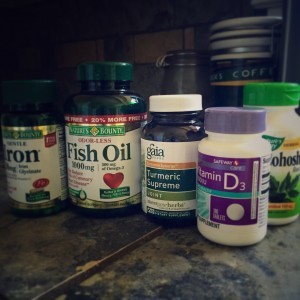Crumbling and Conversation
It did not come as a surprise to me that at a certain age, talking about physical ailments would constitute the lion’s share of my conversations. Even if I hadn’t seen all the birthday cards on the topic in the “Just a Laff!” section of the drugstore aisle, I harbor a vivid memory of an older cousin’s wedding shower when I was a little girl. Did the aunts discuss the impending nuptials? No they did not. They discussed, in great detail, one of the uncles and his gallbladder attack, and how he brayed like a donkey from pain, and if you think a nine year old girl didn’t form a mental image of her uncle braying like a donkey that haunts her forty years later, you’d be as wrong as it was to tell that story in front of a nine year old girl.
Ahem. So. I knew the talk of aches and pain was coming. I just didn’t realize how much I’d enjoy it when it arrived.
I had lunch last week with a dear friend who lives about seven miles away, which is obviously way too far to ever drive so we haven’t seen each other in two years. We met for lunch and after we hugged each other, here were the first words out of our mouths:
“So you have to tell me about your Lyme disease! And perimenopause!”
“Ok but then I want to hear all about your frozen shoulder!”
We said these things with huge grins of anticipation, leaning toward one another into the center of the table, just like I remember doing with my high school friends after they’d gone on their first date with a new crush. We were more than interested, we were excited to talk about our failing physical forms.
For the next 90 minutes, anytime the waitress came by to check on us, she heard something like, “I tried acupuncture once, it made me feel like I was high but it definitely helped the mobility,” and “So I hooked up to a Vitamin C drip IV twice a month and that seemed to give me more energy,” and “Cupping was awful. My back was covered it bruises. Yet I couldn’t wait to go back.” After a certain point the waitress no longer returned to refill our water glasses and I don’t think we can blame the California drought.
I think the reason we are genuinely thrilled, in our forties and fifties and beyond, to have these conversations is because we know we could have a need for this information at any time. You hold your neck at a weird angle when blow drying your hair, you crack your knee against a door sill, you lift a suitcase wrong, and you are not shaking it off like you did when you are 20. You are now going to physical therapy. That’s why everyone born before 1980 wants to know how to avoid injury and illness and how, if they do fall prey to it, to recover as quickly as possible.
My lack of medical degree notwithstanding, I am now the go-to person for diagnosing frozen shoulders via FB, Twitter, text, and phone. Everyone who feels a little twinge in their shoulder calls me and asks, “When did it start? How did it feel? What should I do?” And guess what: if I met someone who had two frozen shoulders – my Cupper assures me they exist – you KNOW I would be buying that person a cocktail, raising it gingerly to his or her lips, and saying, “So when did the second one start? How did it feel? What should I do?”
I suppose I should feel embarrassed at this outward sign of aging, this utter loss of care about what people think when I start asking at cocktail parties whether anyone knows if turmeric capsules really help joint pain? But instead I feel strangely empowered and wise. I’m the one you 20-somethings will someday be seeking out, when suddenly you can’t reach your back pocket without a lightening bolt of pain down your bicep. You can’t outrun time and when you figure that out, it’s the people with knowledge of rehab stretches and tinctures and reiki treatments who will be treated like gods.
So to paraphrase Dorothy Parker: If you don’t have anything nice to say (about your health,) come sit by me.
Feeling stressed and overwhelmed? Fist bump. Join me this Sunday, June 7 at 4 pm at the Mill Valley Public Library in Marin where I’ll be interviewing my friend, happiness expert and sociologist Dr. Christine Carter, about her newest book, “The Sweet Spot: How To Find Your Groove at Work and Home” (2015.) I’ve already adopted her “Minimum Effective Dose” approach for knowing when good enough is good eno










 CommentsHaha! Heh, um… so do turmeric pills help with joint pain ... by EllenRelated StoriesSeeing Live Music in Your 40s: Hurts So Good6 Easy Spring Decorating Tips From My Recent Emergency Home RepairNeighborhood Listserv Lament
CommentsHaha! Heh, um… so do turmeric pills help with joint pain ... by EllenRelated StoriesSeeing Live Music in Your 40s: Hurts So Good6 Easy Spring Decorating Tips From My Recent Emergency Home RepairNeighborhood Listserv Lament




